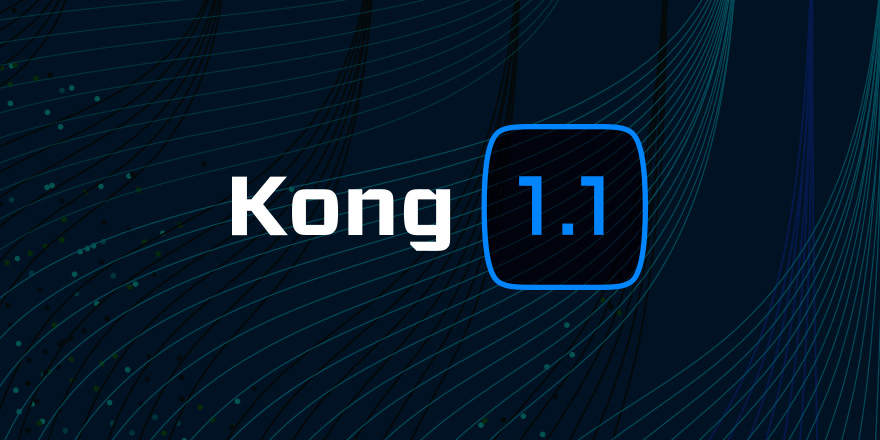Hello everyone,
We are excited to announce that Kong 1.1 is here!
Download Kong 1.1.0 today!
1.1 contains the following new features:
- Declarative Config
- DB-less deployment option
- Entity tags
- Automatic bulk DB import
- Automatic transparent proxying
It also includes some fixes:
- Improved orchestration for Kubernetes sidecar injection
- Improvements to stream handling
- Support for ACL authenticated groups
You can browse the complete list of changes for this release on GitHub.
Suggested Upgrade Path 
Unless indicated otherwise in one of the upgrade paths of this document, it is possible to upgrade Kong without downtime:
Assuming that Kong is already running on your system, acquire the latest version from any of the available installation methods and proceed to install it, overriding your previous installation.
If you are planning to make modifications to your configuration, this is a good time to do so.
Then, run migration to upgrade your database schema:
$ kong migrations up [-c configuration_file]
If the command is successful, and no migration ran (no output), then you only have to reload Kong:
$ kong reload [-c configuration_file]
Reminder : kong reload leverages the Nginx reload signal that seamlessly starts new workers, which take over from old workers before those old workers are terminated. In this way, Kong will serve new requests via the new configuration, without dropping existing in-flight connections.
Upgrade to 1.1
Kong adheres to semantic versioning, which makes a distinction between "major", "minor" and "patch" versions. The upgrade path will be different on which previous version from which you are migrating. If you are upgrading from 0.x, this is a major upgrade. If you are upgrading from 1.0.x, this is a minor upgrade. Both scenarios are explained below.
1. Dependencies
If you are using the provided binary packages, all necessary dependencies are bundled. If you are building your dependencies by hand, you should be aware of the following changes:
- The required OpenResty version is 1.13.6.2, but for a full feature set, including stream routing and service mesh abilities with mutual TLS, you need Kong’s openresty-patches. Note that the set of patches was updated from 1.0 to 1.1.
- The minimum required OpenSSL version is 1.1.1. If you are building by hand, make sure all dependencies, including LuaRocks modules, are compiled using the same OpenSSL version. If you are installing Kong from one of our distribution packages, you are not affected by this change.
2. Breaking Changes
Kong 1.1 does not include any breaking changes over Kong 1.0, but Kong 1.0 included a number of breaking changes over Kong 0.x. If you are upgrading from 0.14,x, please read the section on Kong 1.0 Breaking Changes carefully before proceeding.
3. Suggested Upgrade Path
Upgrade from 0.x to 1.1
The lowest version that Kong 1.1 supports migrating from is 0.14.1. if you are migrating from a previous 0.x release, please migrate to 0.14.1 first.
For upgrading from 0.14.1 to Kong 1.1, the steps for upgrading are the same as upgrading from 0.14.1 to Kong 1.0. Please follow the steps described in the "Migration Steps from 0.14" in the Suggested Upgrade Path for Kong 1.0.
Upgrade from 1.0.x to 1.1
Kong 1.1 supports a no-downtime migration model. This means that while the migration is ongoing, you will have two Kong clusters running, sharing the same database. (This is sometimes called the Blue/Green migration model.)
The migrations are designed so that there is no need to fully copy the data, but this also means that they are designed in such a way so that the new version of Kong is able to use the data as it is migrated, and to do it in a way so that the old Kong cluster keeps working until it is finally time to decomission it. For this reason, the full migration is now split into two steps, which are performed via commands kong migrations up (which does only non-destructive operations) and kong migrations finish (which puts the database in the final expected state for Kong 1.1).
- Download 1.1, and configure it to point to the same datastore as your 1.0 cluster. Run kong migrations up.
- Once that finishes running, both 1.0 and 1.1 clusters can now run simultaneously on the same datastore. Start provisioning 1.1 nodes, but do not use their Admin API yet. If you need to perform Admin API requests, these should be made to your 1.0 nodes. The reason is to prevent the new cluster from generating data that is not understood by the old cluster.
- Gradually divert traffic away from your 1.0 nodes, and into your 1.1 cluster. Monitor your traffic to make sure everything is going smoothly.
- When your traffic is fully migrated to the 1.1 cluster, decommission your 1.0 nodes.
- From your 1.1 cluster, run: kong migrations finish. From this point on, it will not be possible to start 1.0 nodes pointing to the same datastore anymore. Only run this command when you are confident that your migration was successful. From now on, you can safely make Admin API requests to your 1.1 nodes.
Upgrade Path from 1.1 Release Candidates
The process is the same as for upgrading from 1.0 listed above, but on step 1 you should run kong migrations up --force instead.
Installing 1.1 on a Fresh Datastore
The following commands should be used to prepare a new 1.1 cluster from a fresh datastore:
$ kong migrations bootstrap [-c config]
$ kong start [-c config]
You can read more about the new features in 1.1 in our release blog.
We are incredibly excited about this new release. Please try it out! As always, you can reach us via this forum or via GitHub issues 1 if you need any help or experience problems.
We’d like to thank everyone who gave us feedback for our release candidates — this release is in part thanks to you!
